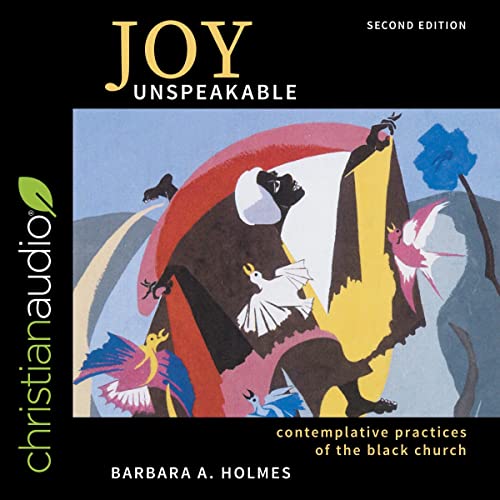What do you think?
Rate this book


Author Bio:Barbara A. Holmes is Associate Professor of Ethics and African American Religious Studies at Memphis Theological Seminary. An accomplished attorney as well as an ordained pastor and theologian, she is author of Race and the Cosmos: An Invitation to View the World Differently (2002) and A Private Woman in Public Spaces: Barbara Jordan's Speeches on Ethics, Public Religion, and Law (2000). FORTRESS INTRODUCTION TO THE PROPHETS
Audio CD
First published July 1, 2004
Part of the importance of reading widely is opening up our perspectives to correction. Joy Unspeakable is both discussing the contemplative practices of the Black church but redefining contemplation for those in and outside the Black church
I did not read Joy Unspeakable quickly. l slowly read the book over a couple of months. I probably read it a bit too slowly but I finished it as I was halfway through Armchair Mystic, a book assigned for my Spiritual Direction program. Armchair Mystic is attempting to teach the basics of contemplative prayer. On, the whole it is a helpful book but it is rooted in a white western concept of contemplation.
"Black people for far too long have been forced to refine our message according to what is comfortable for the mainstream. We have made a distinctive choice not to do it...Our goal is to be free and authentic, not to pacify others." Joy Unspeakable redefines or explores aspects of contemplation that have been under-appreciated. There are more traditional ideas like music and traditional liturgy and prayer and historical legacy. But more important to me is the non-traditional, activism, the leadership of Obama, BLM, and the subversion of older activist models, modern music, hip hop, blues, jazz, etc.
When the word contemplation comes to my mind, I think of Thomas Merton and his lengthy and illuminating discourses about the practices that include complete dependence on God. But I also want to talk about Martin Luther King Jr. and his combination of interiority and activism, Howard and Sue Bailey Thurman and their inward journeys. I want to present Sojourner Truth, Harriet Tubman, Fannie Lou Hamer, Barbara Jordan, and the unknown black congregations that sustained whole communities without fanfare or notice.
Part of the importance of Joy Unspeakable and considering contemplation from a position that is beyond silence and individual prayer is that contemplation is fuel to an integrated life.
"...the human task is threefold. First, the human spirit must connect to the Eternal by turning toward God’s immanence and ineffability with yearning. Second, each person must explore the inner reality of his or her humanity, facing unmet potential and catastrophic failure with unmitigated honesty and grace. Finally, each one of us must face the unlovable neighbor, the enemy outside of our embrace, and the shadow skulking in the recesses of our own hearts. Only then can we declare God’s perplexing and unlikely peace on earth."
A significant portion of what I found helpful is a focus on the communal aspects of contemplation.
The key to contemplation in the black church seems to be its emergence as a communal practice. Although European mystics and contemplatives often lived in community, they tended to focus on the individual experience of encountering the divine presence. African American contemplatives turned the “inward journey” into a communal experience. In this ethnic context, the word contemplation includes but does not require silence or solitude. Instead, contemplative practices can be identified in public prayers, meditative dance movements, and musical cues that move the entire congregation toward a communal listening and entry into communion with a living God.
I have 26 highlights on my Goodreads page. This is a good book and I probably need to re-read it again in a year or so.